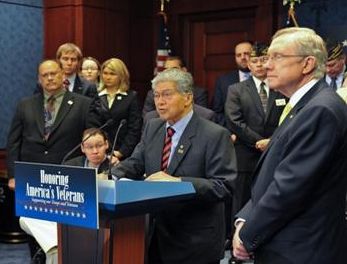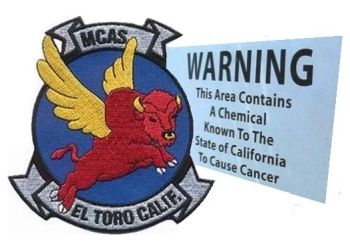
Publisher:
Bonnie King
CONTACT:
Newsroom@Salem-news.com
Advertising:
Adsales@Salem-news.com

~Truth~
~Justice~
~Peace~
TJP
Jan-27-2010 13:40

 TweetFollow @OregonNews
TweetFollow @OregonNews
Senate Considers Bill for Environmental Hazard Exposures
Robert O'Dowd Salem-News.comCamp Lejeune veterans and family members are automatically covered under the TRICARE program. Veterans and dependents of other bases must await the decision of an Advisory Board. No provision is made for civilian workers injured from exposure to environmental hazards.
 Senator Daniel Akaka (D, HI) Courtesy: veterans.senate.gov |
(WASHINGTON D.C.) - The Senate Veterans Affairs Committee will hold hearings on Thursday, January 28th on an environmental hazard exposure bill drafted by Senator Akaka, (D, HI), Chairman, Senate Veterans Affairs Committee.
According to an informed Congressional source, a vote is expected on the bill entitled, “Examination of Exposures to Environmental Hazards During Military Service Act of 2010.” If the vote is along party lines, look for bill to be approved by the Committee and become law this year. The hearing should start at 9:30 am, and will stream live from the Committee’s website[1].
The Salem-News obtained a draft copy of the bill this week. Our review showed the bill provides authority to the Secretaries of Veterans Affairs and Defense to establish an Advisory Board to provide expert advice on exposures of current military, veterans and their dependents to environmental hazards on military installations.
The bill excludes exposure of military personnel to environmental hazards in Iraq and Afghanistan and any military installation where imminent danger pay is authorized. For example, military personnel exposed to burn pits in Iraq would not be covered by the bill. Also, the bill does not cover civilian workers exposed to environmental hazards.
The bill does not provide for any monthly payments to veterans for their current disability . In comparison, VA disability claims do provide for both health care and monthly payments to a veteran. In the case of “military exposures” to environmental hazards, veterans are treated differently since they receive no monthly compensation.
There are 130 military bases on the National Priority List (EPA Superfund). Thousands of veterans, their dependents, and civilian workers served on these bases and an unknown number were exposed to contaminants and suffer adverse health effects, including death.
Senator Akaka’s bill assumes veterans and their family members are aware of exposure to contaminants in the military. For the most part, this is not true. Most veterans are clueless. With the exception of Marine Corps Base Camp Lejeune, there is no legal requirement for the government to notify any veteran or dependent of their possible exposure to a contaminant and the related health effects. Why? Would government notification increase the number of fraudulent claims for disability compensation or affect recruitment? Maybe. But quick prosecution for any fraudulent claims should serve as an effective deterrent while recruitment is more likely to be affected by dishonest dealings.
However, there’s no provision in this bill to notify any veteran or family members of possible exposure to an environment hazard and maybe interest in amending the bill. Except for Camp Lejeune and Naval Air Station Atsugi, Japan, there are few if any pending claims for environmental hazards. Why not amend the bill to require public service announcements and use of the Veteran Service Organizations (VSOs) to notify their memberships?
The good news is that Senator Akaka proposed bill covers everyone in the military service who may have been exposed to an environmental hazard and has filed either a VA claim (veteran) or Federal tort claim (dependent) with the exception of veterans who receive imminent danger pay (e.g., those who serve in Iraq and Afghanistan). But, like most laws, the “devil” is in the details.
Most people would agree there’s a moral responsibility to notify veterans and their dependents that may have been exposed to environmental hazards. With over 1,400 military sites contaminated with trichloroethylene (TCE) alone, the number of veterans and dependents exposed to this organic solvent could run into the thousands.
TCE was used as a degreasing solvent by both the military and industry for decades, contaminating soil and groundwater. The three common routes of exposure to TCE and other environmental contaminants are ingestion (drinking water), inhalation, and dermal contact. For decades, TCE was used by the military to degrease aircraft parts. It’s an excellent cleaning solvent. Of the 1,400 military sites contaminated with this chemical, about half are Air Force bases.

This is not simply an issue of one or two rusting drums sitting in an open field on some military base. Camp Lejeune veterans and dependents, for example, were exposed to a lengthy list of toxic chemicals in the water wells on this North Carolina base. Former MCAS El Toro, California, another Marine Corps base, was responsible for a toxic plume of TCE spreading off the base into Orange Country, threatening the municipal water supply. The Navy spent hundreds of millions of dollars in remediation at El Toro, another EPA Superfund site.
At Camp Lejeune, thousands were exposed to carcinogens in the drinking water. A number died from this ingesting contaminated drinking water. The list includes children with developing immune systems and embryos who are especially vulnerable to toxic chemicals.
Senator Akaka’s bill is the latest attempt to address the need for compensation for veterans and family members exposed to environmental hazards like TCE.
The bill establishes an Advisory Board of seven members, including three scientists with backgrounds in environmental exposure or environmental exposure assessments, health monitoring, or other relevant fields. If needed, the Advisory Board has the authority to convey a science review panel of seven scientists with similar backgrounds as the scientists on the board.
The idea is that environmental experts with backgrounds in environmental science will help both the Veterans Administration and the Defense Department decide complex environmental hazard issues and reduce the backlog of veterans and dependents claims.
In practice, whether this will work to provide needed health care for veterans and family members injured by environmental hazards or act as a mechanism to deny veterans claims and tort claims from family members is an unanswered question. As the saying goes, “The proof of the pudding is in the eating.”
A major change for veterans is that the DOD and not the VA will be responsible for providing financial compensation or health benefits under the TRICARE program. The Advisory Board has no authority to require DOD to provide benefits, only to make recommendations. However, DOD would be hard pressed to deny recommendations for compensation and it very unlikely that TRICARE benefits would be denied, according to an informed Congressional source.
The good news is that Senator Akaka’s bill covers everyone in the military service who may have been exposed to an environmental hazard and avoids the need for separate hearings and legislation for each base on the National Priority List (EPA Superfund). One exception is that veterans who receive imminent danger pay (e.g., those who serve in Iraq and Afghanistan) are specifically excluded from the bill. But, like most laws, the “devil” is in the details.
The bill could be used to reduce the backlog of veterans and dependents claims and serve as a “cover” for the VA and DOD to deny compensation to the injured. The scientists on the Advisory Board and the science advisory panel are key players in this process. The decisions they reach relating to causality of exposure to environmental hazards like TCE are critical to ensuring that veterans and their family members receive health care.

Both the Environmental Protection Agency (EPA) and the Agency for Toxic Substances Disease Registry (ATSDR) have identified illnesses linked or associated with environmental hazards. If the decisions of EPA and ATSDR are used by the Advisory Board as a basis to determine service connections, then most veterans and family members should be satisfied with the results. If the Advisory Board attempts to determine “causality” for a particular disease to an environmental hazard, then could easily result in a forum to support denial of military exposure claims. The good news is that at least for Camp Lejeune, the right decision was made.
The bill requires the Advisory Board to consider military exposure claims related to Camp Lejeune, North Carolina, and Atsugi Naval Air Station, Japan, as the first two cases. The bill specifies that Camp Lejeune veterans and family members are eligible for TRICARE program benefits.
Camp Lejeune, with its history of contamination of base wells, had the potential to add a half-a-million dependents to the VA health system at an estimated cost of $4 billion and “at the expense of the veterans who rely on VA’s hospitals and clinics,” according to a Congressional source.
To avoid the burden on the VA Medical Heath care system, the bill provides TRICARE health care benefits for Camp Lejeune veterans and family members.
Within 90 days after the bill becomes law, the DOD is required to compile a list of “individuals exposed to environmental hazards at Camp Lejeune, during the period…in which the water at Camp Lejeune was contaminated with volatile organic compounds, including known and probable human carcinogens.” Camp Lejeune dependents would be eligible for hospital care, medical services, and nursing home care under the TRICARE program for any condition or disability that is associated with exposure to contaminants at the base. Veterans of Camp Lejeune would be covered by the TRICARE program for any medical condition.
For bases other than Camp Lejeune, here’s how it will work: The bill establishes an Advisory Board with 7 members appointed for a 3 year term by the President. The Advisory Board includes 3 scientists with backgrounds in environmental exposure or environmental exposure assessments, health monitoring or other relevant fields. If need, the Advisory Board has the ability to convey an expert panel of 7 scientists with backgrounds in environmental exposure or environmental exposure assessments, health monitoring or other relevant fields to evaluate health hazards and to provide expert advice to the Advisory Board. Other members on the Advisory Board include representatives from Veteran Service Organizations (2 members) and other Federal agencies (2 members) other than the VA and DOD.
This is not simply an issue of one or two rusting drums sitting in an open field on some military base. Camp Lejeune veterans and dependents, for example, were exposed to a lengthy list of toxic chemicals in the water wells on this North Carolina base. An unknown number have died from exposure to carcinogens like trichloroethylene (TCE), tetrachloroethylene (PCE), benzene, and vinyl chloride in the drinking water. The list includes children with developing immune systems are especially vulnerable to toxic chemicals.
If the Advisory Board makes a favorable decision, then the final decision for approval of compensation or health care benefits under TRICARE rests with DOD. You read correctly.
DOD, with the most EPA Superfund sites, gets to make the decision on the award of benefits. Under the Akaka bill, the Advisory Group makes a recommendation to DOD to award compensation or health care benefits under TRICARE.
If the Advisory Board finds the extent of exposure is “insufficient to warrant further consideration, a recommendation of this findings is made to the VA and DOD. There’s no question that the VA more than likely deny all veterans claims related to environmental hazards covered by the Advisory Board’s recommendation. Veterans would still have appeal rights under the VA regulations, but don’t look for any reversal of a denials.
Civilian workers exposed to environmental hazards are not covered by the bill. If injured, our assumption is that these workers would have to file a Federal tort claim (SF-95). Any favorable decision reached by the Advisory Board for military
In summary, the Senator Akaka bill covers everyone in the military service who may have been exposed to an environmental hazard and has filed either a VA claim (veteran) or Federal tort claim (dependent) with the exception of veterans who receive imminent danger pay (e.g., those who serve in Iraq and Afghanistan) and civilian workers. Like most laws, the “devil” is in the details. Only time will tell if it proves successful.
[1] veterans.senate.gov/hearings.cfm
================================================ Bob O’Dowd is a former U.S. Marine with thirty years of experience on the east coast as an auditor, accountant, and financial manager with the Federal government. Half of that time was spent with the Defense Logistics Agency in Philadelphia. Originally from Pennsylvania, he enlisted in the Marine Corps at age 19, served in the 1st, 3rd, and 4th Marine Aircraft Wings in 52 months of active duty in the 1960s. A graduate of Temple University, Bob has been married to Grace for 31 years. He is the father of two adult children and the grandfather of two boys. Bob has a blog site on former MCAS El Toro at mwsg37.com. This subject is where Bob intersected with Salem-News.com. Bob served in the exact same Marine Aviation Squadron that Salem-News founder Tim King served in, twenty years earlier. With their combined on-site knowledge and research ability, Bob and Tim and a handful of other ex-Marines, have put the contamination of MCAS El Toro on the map. The base is highly contaminated with TCE, trichloroethelyne
Bob O’Dowd is a former U.S. Marine with thirty years of experience on the east coast as an auditor, accountant, and financial manager with the Federal government. Half of that time was spent with the Defense Logistics Agency in Philadelphia. Originally from Pennsylvania, he enlisted in the Marine Corps at age 19, served in the 1st, 3rd, and 4th Marine Aircraft Wings in 52 months of active duty in the 1960s. A graduate of Temple University, Bob has been married to Grace for 31 years. He is the father of two adult children and the grandfather of two boys. Bob has a blog site on former MCAS El Toro at mwsg37.com. This subject is where Bob intersected with Salem-News.com. Bob served in the exact same Marine Aviation Squadron that Salem-News founder Tim King served in, twenty years earlier. With their combined on-site knowledge and research ability, Bob and Tim and a handful of other ex-Marines, have put the contamination of MCAS El Toro on the map. The base is highly contaminated with TCE, trichloroethelyne
Articles for January 26, 2010 | Articles for January 27, 2010 | Articles for January 28, 2010




googlec507860f6901db00.html
Salem-News.com:
Terms of Service | Privacy Policy
All comments and messages are approved by people and self promotional links or unacceptable comments are denied.
Jim Davis, Veterans-For-Change January 27, 2010 7:29 pm (Pacific time)
I very strongly recommend every veteran, spouse, friend of a veteran call toll free 866-272-6622, ask for Senator Akaka's office and tell him you are 100% against this bill! Then call the same number again and ask for your Senator and ask that they NOT support this bill in any way!
[Return to Top]©2026 Salem-News.com. All opinions expressed in this article are those of the author and do not necessarily reflect those of Salem-News.com.